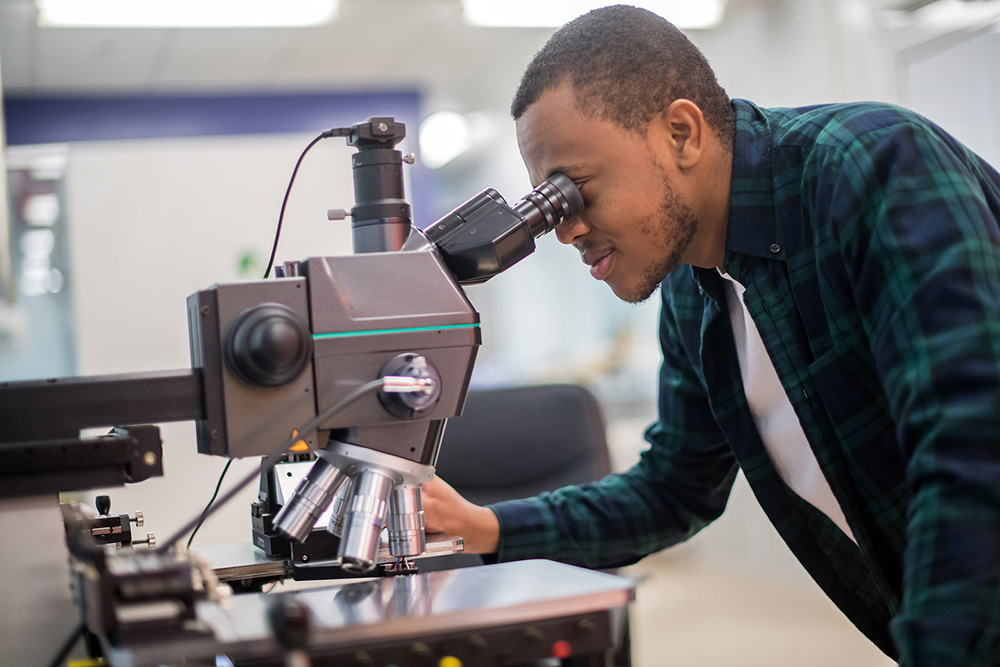When Chris Williams recently discovered an old photo of his father as a young man — situated in a lab “not unlike the ones I’ve spent a lot of time in” — he recognized the legacy within his family toward academia and the sciences.
“I think most of us would like to believe our success is entirely self-determined,” he says, “but seeing that picture made it impossible for me to deny how important representation has been in my own life, even having grown up hearing stories from much of my family about their own struggles with navigating through academia. I think with that realization came an obligation to do my own part.”
As the inaugural recipient of the Indigenous and Black Engineering and Technology (IBET) Momentum Fellowship at Queen’s, Williams is not only contributing to innovation in wearable technology, he’s become part of an important initiative to change the face of engineering research and education in Ontario.
He credits the intention in the development of the IBET Fellowship as a primary influence in his decision to apply. “Learning more about the team behind the initiative and seeing how central mentorship was to what they were trying to achieve made me want to apply and definitely played into my decision to commit to a PhD here in Ontario.”
The prospect of working with a globally recognized researcher lured him to Queen’s University, the Department of Electrical and Computer Engineering, and the lab of Assistant Professor Shideh Ameri.
The IBET Fellowship was created by six Ontario universities as a way to expand pathways for Indigenous and Black students pursuing doctoral degrees in engineering, in preparation for careers as professors and industry researchers. Williams is the first Queen’s recipient, and will receive $30,000 a year over four years, along with access to mentorship and community support.
“It is our hope that the IBET Fellowship award will really change the academic landscape and increase diversity in Canadian technology industries,” says Dean Kevin Deluzio. “Indigenous and Black students need to see themselves in the professors, researchers, and leaders who work with them.”
Williams says that the Momentum Fellowship award is much more than a scholarship to further his research work. “I was lucky to grow up in a family of educators, which helped me see research and academia as a potential career. Not everyone has that environment,” he says. “The Momentum Fellowship is a serious and important effort in tackling representation, and I’m proud to be part of inspiring the next generation of Black and Indigenous engineering students.”
Upon completion of his undergraduate degree in 2018 at the University of Waterloo in Nanotechnology Engineering, Williams moved to Kingston where he earned a Master’s degree in Electrical and Computer Engineering at Queen’s in 2021. He began his PhD study earlier this year.
Williams’ research focus includes the study of graphene tattoos, ultra-thin wearable devices that can be used to monitor health more proactively over extended periods. Graphene electronic tattoos are highly conductive, self-adherent, stretchable and mostly transparent. Besides facilitating conventional electrophysiological measurements such as heart rate, they can also be used to measure everything from skin temperature and hydration to brain activity. They also have applications beyond health; sensing human signals such as eye movement to control objects as part of a human-machine interface, for example.
“Graphene tattoos are surprisingly resilient because of how well they conform to the skin, and can be effective for days or even weeks,” says Williams. “Our next step is to find better ways of bridging the gap between 2D electronics and conventional 3D electronics so we can make health monitoring more private and convenient for people who would otherwise have to be hooked up to bulky portable monitoring equipment, such as Holter monitors.”
Williams says that his supervisor’s expertise in wearable technologies was a significant factor in his decision to study at Queen’s. “This is a huge opportunity to collaborate with a multidisciplinary team and to work with an amazing supervisor who has such expertise in this field of study,” he says. “She is so generous with her time and has given me such great advice.”
Ameri is equally impressed with Williams, noting that he’s a perfect candidate for a research team. “He has an incredible balance of curiosity, passion and precision,” she says. “He’s a collaborative team player with a great system for learning.”
